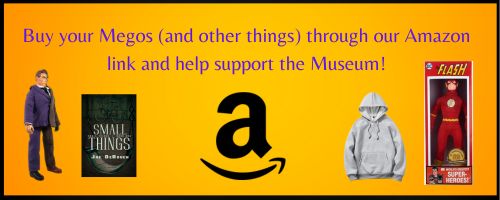Gerry Conway, via social media, has been talking about how the comic industry has gotten to the state it is in and what he would do the change things and try to turn it around...
I don't talk much about the state of the industry here (it's not usually germane to Mego discussions) but it is a topic I engage in at some of the comic sites I participate in, and Conway's assessment of the industry woes and its causes reflect things I have been saying for a decade now. I'm not sure I think his plan moving forward would work-I think periodicals are a niche collector format now and of no interest to mass market consumers so I don't see a plan based on periodical format comics succeeding in the mass market, but I do agree that the audience and market he suggests are what should be targetted moving forward, it just needs to be in a format that appeals to that audience and market, which current sales show to be a book format comic priced between $10 and $20 like the YA GN that are the fastest growing segment of publishing as a whole currently. But I am just an armchair amateur, so who knows.
-M
To state the obvious, comic book publishing is in serious trouble, with a business model that almost literally has no future. Yet comic books are a source of intellectual property for exploitation in all sorts of popular media and have never have greater potential.
So, why is this? Why do comics as a storytelling form (superhero and otherwise) have such an enormous impact on popular culture but comic book publishers are struggling to survive? Why are publishers almost universally failing to succeed at actual publishing? My basic answer is— they're pursuing the *wrong market.* And they've been doing so, with increasing desperation, since the late 1970s.
Let's put aside the incredible business stupidity of depending on a single distribution method (direct sales to single-audience comic book stores). The problem is bigger: the defined audience for mainstream comics is an audience that by definition constantly shrinks.
For a variety of self-enforcing reasons, publishers have defined the primary audience for mainstream comics as, in effect, long term fans and potential collectors. Hence, fan-oriented naval gazing continuity, tri-annual "events", reboots, collector-oriented variant covers, etc. Every single one of these marketing ploys is designed *solely* to appeal to existing readers. Even reboots, ostensibly intended to offer "jumping on" points to new readers, actually require familiarity with previous iterations to provide interest. New readers aren't welcomed by the existing creative strategy at the two mainstream publishers— if anything, new readers are actively *discouraged* by the publishers' frantic pursuit of motivated, existing readership. The clubhouse is closed. Stay out.
Publishers, of course, will disagree with this analysis and say they're always trying to provide on-ramps to new readers. But any serious look at what they're offering, in the main, reveals a decided tilt— in fact a massive tilt— toward privileging the existing readership. And this makes sense, in a way, because of a cultural creative shift in the editorial direction of the publishing houses that can be traced back to the era I'm from— the late 1960s, early 1970s.
In the mid 1960s, around 1967, DC Comics offered a weekly tour of their offices during the summer. I went on the tour (and like others, Len Wein and Marv Wolfman among them, became a regular). At one point I had a conversation with then-editor Julie Schwartz. We were talking about a Green Lantern story, and I made some fanboy comment about what I hoped would happen. Julie paused and looked at me. "How old are you?" "Fourteen," I said. He snorted. "Too old. You're not my reader." And he walked off.
I later learned that at DC (and also at Marvel) in the 1960s the commonly accepted view of the comic book readership was a kid (undoubtedly male) between the age of 9 and 13. What today's book publishers would call Middle-Grade Readers. This makes sense. If we're honest about it, the basic, root appeal of superhero stories is to that part of ourselves that lives in a pre-sexualized, pre-adolescent dream state in which anything is possible. It's the world of "Harry Potter and the Sorcerer's Stone." Like "Harry Potter and the Sorcerer's Stone" (or Philosopher's Stone if you want to be pedantic), young adults and adults can enjoy superhero stories too, and even want those stories to evolve and mature, just as the Potter books evolved and matured. But. But. But Regardless of what appeal the first Potter book might have for older and existing readers…its primary readership was intended to be, and remains, Middle-Grade, 8 to 12. And the same used to be true for comics, particularly superhero comics. Until my generation came along. Yeah, we Boomers f**ked it up, as usual.
When I and my cohorts replaced the creatives who'd given the comic book business massive success in the 1960s, folks like Stan Lee and Julie Schwartz, we brought with us our Boomer self-obsession. We didn't want to create comics for kids. We wanted comics for *us.* That's the origin of comic book superheroes' shift from Middle-Grade readership in the 1960s to Young Adult readership in the 1970s, and Adult readership in the 1990s and beyond— the refusal of Boomer creatives and editors like myself and others to Let It Go. We redefined the readership comics were aimed at— coinciding with a shift in distribution that allowed that redefinition to stick. The result is a dead end for comic book publishing as a business. How would I change this?
I'd cancel every existing superhero comic book, and publish a limited new line for a Middle-Grade readership, simplify characters and storylines, and eliminate every "event" that requires more than passing familiarity with the basic simplified continuity. Ten-fifteen titles.
For existing readers, I'd offer a separate, higher priced graphic novel line with whatever expanded adult storylines creators and readers want to explore. But this would be separate. Not monthly. Not the mainstream.
And I'd do *everything* possible to get monthly comics into supermarkets and movie theaters and Walmart and Target and Costco and offer subscription services through Amazon. Pursue every alternate distribution Avenue possible.
The present course taken by the major publishers is a dead end. They're pursuing the wrong readership. There's a bigger audience out there. We just have to welcome them.
So, why is this? Why do comics as a storytelling form (superhero and otherwise) have such an enormous impact on popular culture but comic book publishers are struggling to survive? Why are publishers almost universally failing to succeed at actual publishing? My basic answer is— they're pursuing the *wrong market.* And they've been doing so, with increasing desperation, since the late 1970s.
Let's put aside the incredible business stupidity of depending on a single distribution method (direct sales to single-audience comic book stores). The problem is bigger: the defined audience for mainstream comics is an audience that by definition constantly shrinks.
For a variety of self-enforcing reasons, publishers have defined the primary audience for mainstream comics as, in effect, long term fans and potential collectors. Hence, fan-oriented naval gazing continuity, tri-annual "events", reboots, collector-oriented variant covers, etc. Every single one of these marketing ploys is designed *solely* to appeal to existing readers. Even reboots, ostensibly intended to offer "jumping on" points to new readers, actually require familiarity with previous iterations to provide interest. New readers aren't welcomed by the existing creative strategy at the two mainstream publishers— if anything, new readers are actively *discouraged* by the publishers' frantic pursuit of motivated, existing readership. The clubhouse is closed. Stay out.
Publishers, of course, will disagree with this analysis and say they're always trying to provide on-ramps to new readers. But any serious look at what they're offering, in the main, reveals a decided tilt— in fact a massive tilt— toward privileging the existing readership. And this makes sense, in a way, because of a cultural creative shift in the editorial direction of the publishing houses that can be traced back to the era I'm from— the late 1960s, early 1970s.
In the mid 1960s, around 1967, DC Comics offered a weekly tour of their offices during the summer. I went on the tour (and like others, Len Wein and Marv Wolfman among them, became a regular). At one point I had a conversation with then-editor Julie Schwartz. We were talking about a Green Lantern story, and I made some fanboy comment about what I hoped would happen. Julie paused and looked at me. "How old are you?" "Fourteen," I said. He snorted. "Too old. You're not my reader." And he walked off.
I later learned that at DC (and also at Marvel) in the 1960s the commonly accepted view of the comic book readership was a kid (undoubtedly male) between the age of 9 and 13. What today's book publishers would call Middle-Grade Readers. This makes sense. If we're honest about it, the basic, root appeal of superhero stories is to that part of ourselves that lives in a pre-sexualized, pre-adolescent dream state in which anything is possible. It's the world of "Harry Potter and the Sorcerer's Stone." Like "Harry Potter and the Sorcerer's Stone" (or Philosopher's Stone if you want to be pedantic), young adults and adults can enjoy superhero stories too, and even want those stories to evolve and mature, just as the Potter books evolved and matured. But. But. But Regardless of what appeal the first Potter book might have for older and existing readers…its primary readership was intended to be, and remains, Middle-Grade, 8 to 12. And the same used to be true for comics, particularly superhero comics. Until my generation came along. Yeah, we Boomers f**ked it up, as usual.
When I and my cohorts replaced the creatives who'd given the comic book business massive success in the 1960s, folks like Stan Lee and Julie Schwartz, we brought with us our Boomer self-obsession. We didn't want to create comics for kids. We wanted comics for *us.* That's the origin of comic book superheroes' shift from Middle-Grade readership in the 1960s to Young Adult readership in the 1970s, and Adult readership in the 1990s and beyond— the refusal of Boomer creatives and editors like myself and others to Let It Go. We redefined the readership comics were aimed at— coinciding with a shift in distribution that allowed that redefinition to stick. The result is a dead end for comic book publishing as a business. How would I change this?
I'd cancel every existing superhero comic book, and publish a limited new line for a Middle-Grade readership, simplify characters and storylines, and eliminate every "event" that requires more than passing familiarity with the basic simplified continuity. Ten-fifteen titles.
For existing readers, I'd offer a separate, higher priced graphic novel line with whatever expanded adult storylines creators and readers want to explore. But this would be separate. Not monthly. Not the mainstream.
And I'd do *everything* possible to get monthly comics into supermarkets and movie theaters and Walmart and Target and Costco and offer subscription services through Amazon. Pursue every alternate distribution Avenue possible.
The present course taken by the major publishers is a dead end. They're pursuing the wrong readership. There's a bigger audience out there. We just have to welcome them.
-M


Comment